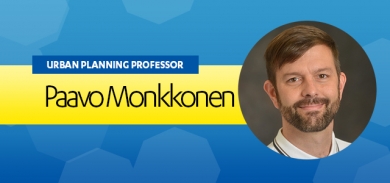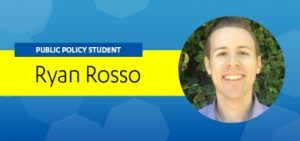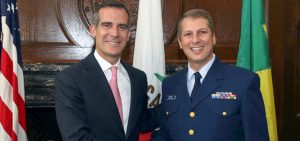New Franklin D. Gilliam, Jr., Award Advances UCLA Luskin’s Mission of Social Justice The new Franklin D. Gilliam, Jr., Social Justice Award was created to advance research that focuses on issues of racial justice and inequality
By Adeney Zo
Franklin D. Gilliam, Jr., served as dean of the UCLA Luskin School of Public Affairs for seven years, and his legacy here continues to inspire and provide support for Luskin students.
Through the efforts of members of the UCLA Luskin advisory board along with many other donors, the new Franklin D. Gilliam, Jr., Social Justice Award was created to advance research that focuses on issues of racial justice and inequality. Reflecting the School’s mission to bring about social change through academic excellence, this award highlights student scholarship that addresses crucial societal issues.
Board Chair Susan F. Rice explains, “Frank Gilliam’s commitment to social justice permeated his leadership approach. His collaborative style in cross-discipline initiatives left a significant legacy on the students, the faculty, the campus and our Board of Advisors. In particular, the Board relished Frank’s pride in the Luskin School students as research practitioners engaging public personnel in social justice issues. It seemed fitting to establish an award recognizing student initiative.”
This year’s award recipients will be studying a wide range of topics related to social justice, diversity and equity.
Susanna Curry, a doctoral candidate in Social Welfare, was selected for a project which will study housing insecurity among millennials. Curry’s ultimate goal as a researcher is to help end homelessness in the U.S., but her research will first examine the causes of housing insecurity among millennials in early stages of adult life.
“I want to encourage social welfare scholarship to include a greater understanding of housing insecurity, that is, the situations in which people find themselves immediately before becoming homeless such as living temporarily in another person’s home, moving frequently, and facing eviction or a high rent burden,” said Curry.
Curry aims to study how childhood adversity and access to social supports, particularly stemming from the foster care system, may influence housing instability among young adults.
“It is important that we better understand living situations and housing-related stressors beyond age 21, and associated risks and resources, so that service providers and policymakers can develop greater supports for these [foster] youth as appropriate into young adulthood,” said Curry.
Curry will also examine on a national scale how social and cultural patterns may factor into this issue.
While Curry’s work will examine a nationwide issue, three recipients of the award will focus their research on issues within UCLA. Elizabeth Calixtro, a master of Public Policy student; Kevin Medina, a master of Social Welfare and master of Public Policy student; and Nisha Parekh, a master of Public Policy and Law student, were selected for their proposal to evaluate diversity and equity programming at UCLA in conjunction with the Office of Equity, Diversity and Inclusion.
“We plan to use the data we collect to create feasible recommendations for the UCLA Office of Equity, Diversity and Inclusion (EDI) regarding ways to harmonize the various EDI-related efforts across campus,” said Medina. “EDI was created less than a year ago, and we aim to provide recommendations that will further this harmonization project.”
All three members of the team have backgrounds in social justice work, allowing for them to advance the mission of the award while also utilizing their combined experience to create change within UCLA.
“We felt that selecting a topic addressing equity issues would allow us to bring together multiple lenses and skill sets to create an impactful policy project,” said Medina. “This award provides us with the necessary and scarce resources to actualize our ambitious vision for our policy project.”
The team will be evaluating the EDI’s programs through focus groups, interviews and a campuswide survey. They will also be contacting universities similar to UCLA in order to understand how other schools implement diversity and equity programming. With the implementation of a new undergraduate diversity requirement for UCLA College freshmen, this study may play an important part in the development of these courses.
Other award recipients are Marylou Adriatico, a master of Social Welfare student, and Joanna L. Barreras, Charles H. Lea III and Christina Tam, all doctoral candidates in Social Welfare.
To learn more about the Franklin D. Gilliam, Jr., Social Justice Award, or to make a contribution, visit this page.
A summary of the project descriptions for the Social Justice Award winners can be found here.



